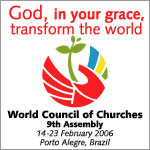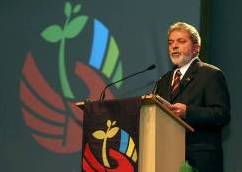Churches must challenge economic institutions, WCC is told
Poverty is no accident, but is the product of unjust economic structures that churches must struggle to reform, a Ugandan economist told a gathering of world church leaders here on February 16.
"Poverty doesn't just 'exist' - it is manufactured by those who control the markets," said Yashpal Tandon, executive director of the South Center in Geneva, Switzerland, a think-tank that deals with issues of trade and economic development in Africa. He made his remarks during a news conference during the ninth Assembly of the World Council of Churches (WCC).
"Poverty is not a natural phenomenon, but is the fruit of deliberate policy, and churches must challenge the economic institutions that create and perpetuate the policies," the Ugandan economist said, speaking in the city where the first World Social Forum was held.
The WCC, which has spoken out on economic-justice issues throughout its 58-year existence, declared during its last Assembly (1998) that "the logic of globalization needs to be challenged by an alternative way of life of community in diversity."
Since that gathering, in Harare, Zimbabwe, a WCC commission has launched "Alternative Globalization Addressing People and Earth" (AGAPE), a call to churches to commit themselves to the eradication of poverty, promotion of fair trade, debt forgiveness and responsible lending, sustainable management of the earth's resources, supporting humans' rights to food, water and public services, land reform, and decent jobs and just wages.
"A world without poverty is not only possible, but is in keeping with the grace of God for the world," the AGAPE founding document says, adding that churches' efforts must be grounded in sound Biblical and theological perspectives.
"The spirituality of the market economy has taken complete possession of some sectors of Christianity," said Brazilian Methodist pastor and theologian Nancy Cardoso Pereira. "Capitalist transnational corporations want more than just greater profits. They want 'the kingdom, the power and the glory.'"
Those who would make a god of capitalism are wise to heed the words of the prophet Ezekiel, Pereira said: "By your great skill in trading you have increased your wealth, and because of your wealth your heart has grown proud. ... You think you are wise, as wise as a God. ...Through your widespread trade you were filled with violence and you sinned"(Ezekiel 28: 2-6, 16-18).
Still, a centralized Marxist economy is not a workable alternative, said Russian Orthodox Archpriest Vsevolod Chaplin, who nonetheless told the media, "The current (free-market) system shows many signs of being a danger to democracy - non-elected and non-controllable forces are controlling the world, and they have no morality and do not listen to civil society."
In February 2004, Chaplin said, the Russian Orthodox Church took the lead in developing a "Code of Moral Principles and Rules in Economy" that he said is based on the Ten Commandments and is gaining traction throughout Russia.
"We should establish such an economic order to realize in a harmonious way both spiritual aspirations and the material interests of both the individual and society," Chaplin told the Assembly, the highest governing body of the WCC, which meets once every seven years.
With so-called "free-trade agreements," government import and export subsidies, international monetary and banking institutions and multinational corporations operating with impunity around the world, Tandon said, "the free market system is a myth - it never existed, nor will it ever."
The challenge to the churches, he said, is to offer alternatives to the current scheme. "People everywhere are engaged in working out their own partial solutions out of their experiments in survival strategies," he said, "but the foremost challenge of our epoch is to change the whole edifice of global production and exchange."
The role of the churches, Pereira said, is to articulate the values on which a new global economic system must be based.
One of those values must be cooperation, Tandon said. "Capitalism is based on competition and greed, and structurally negates cooperation," he said. "Socialism, which is based on cooperation, has not always worked, but people everywhere are trying many cooperative models. Most all of them haven't moved beyond the local, but they are alternative systems."
For example, assembly delegates were told about the Focolare Movement, created in Italy by Chiara Lubich during World War II. Participating businesses agree to divide their profits three ways - the first part for reinvestment; the second for the establishment of new Focolare-related businesses; and the third for direct aid to people in need.
Another model, presented to the Assembly by the United Nations-affiliated International Labour Organization, focuses on educational opportunity, eradication of child labor, economic development that creates sustainable employment with just wages, and, in cooperation with the WCC, ecumenical dialogue that leads to collaboration on specific economic issues.
"The function of religion in economic exchange does not consist of establishing regulations and procedures," Pereira said, "but of determining value, formulating economic values, helping to shape structures and strengthening assessment mechanisms." [Editor: Jerry L. Van Marter for ENI, PCUSANEWS and APD]
(5411 Zeichen)


